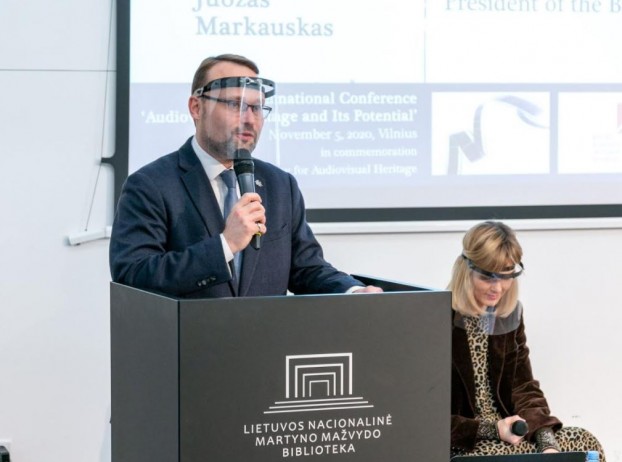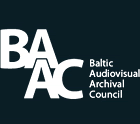First BAAC online conference. Report 2020

Every year on the 27th of October we celebrate World Day for Audiovisual Heritage. On this day, since 2005, the United Nations Educational, Scientific, and Cultural Organization (UNESCO) has chosen to highlight the importance of audiovisual documents and the risks associated with their preservation.
In this regard, the Ministry of Culture of the Republic of Lithuania orginized International Conference on Audiovisual Heritage, which was held online on the 5th of November 2020 and aimed to discuss issues of audiovisual heritage management and dissemination.
Conference partners: Baltic Audiovisual Archives Council, Martynas Mažvydas National Library of Lithuania. The Ministry of Culture kindly thanks the Lithuanian National Radio and Television and the artist Joshua Sabin from the United Kingdom for the provided video and audio material.
Online conference was opened by Mr. Mindaugas Kvietkauskas (Minister of Culture, Republic of Lithuania) who underlined that audiovisual media is very important in our life. It enables us to follow events which can not be attended on site, to hear the voices that could not be heard anymore and to see what went in to oblivion. "Audiovisual archives are an extremely valuable resources of collective memory, as they encode information on the cultural, social and linguistic diversity of communities. It is therefore very important to preserve this heritage and ensure that it is accessible not only to the public but also to future generations. However, this becomes a serious challenge for memory institutions, as this heritage is very fragile and vulnerable”, emphasized Minister M. Kvietkauskas.
Keynote speakers were representing leading memory institutions EUROPEANA, WIKIMEDIA, and ICCROM; other distinguished specialists from Lithuania, Latvia, Estonia, Poland, the Netherlands, and Sweden shared examples of the best practice.
Harry Verwayen, Executive Director of the Europeana Foudndation, discussed the impact and consequences of the COVID-19 pandemic on digital transformation, while John Andersson, Executive Director of the Wikimedia Foundation, presented the Wikimedia platform and its capabilities to professionals and is currently ongoing projects in education and other fields.
The main challenges related to the priorities, preservation and accessibility of the audiovisual heritage for creative use, and possible strategies were discussed by Aparna Tandon, Head of Digitization Programs at the UNESCO Advisory Expert Organization ICCROM, based in Italy.
Although in 2020 the coronavirus pandemic has disrupted cultural, artistic, and other activities around the world, new opportunities for digital transformation, more efficient use of digitized and digital cultural heritage resources have risen up. In order to improve the field of audiovisual heritage, this year the Ministry of Culture of the Republic of Lithuania is commissioning a study “Analysis of the Lithuanian Audiovisual Cultural Heritage Preservation and Access System and Recommendations for Development”. This initiative was presnted by dr. Lina Kaminskaitė-Jančorienė (NGO Avilys)
Vaida Kazlauskaitė presented the archive collection of the company Lietuvos Kinas (LIthuanian Cinema) and the process of determining heritage values. Maria Drabczyk, an expert on international projects from the Polish National Film Archive – Audiovisual Institute (FINA), shared her experiences and projects based on audiovisual heritage content in order to increase the accessibility of this material to different audiences. Johan Oomen, Head of Research and Development at the Nedtherlands Sound and Vision Institute, paid special attention to the application of artificial intelligence and big data to the processing, management and re-use of audiovisual content. Zane Grosa from the National Library of Latvia discussed the results of the digitization of the audiovisual heritage in the country. Kaisa Unander introduced the activities of the Swedish National Library in digitizing the country's audiovisual heritage. Jarmo Nagel from the Estonian National Archives reviewed the collection of audiovisual content in Estonia, focusing on the search for new audiences.
Recording of the conference:
